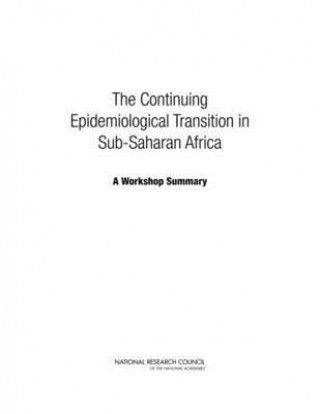
Code: 04579459
Continuing Epidemiological Transition in Sub-Saharan Africa
by Committee on Population, Division of Behavioral and Social Sciences and Education, National Research Council
Among the poorest and least developed regions in the world, sub-Saharan Africa has long faced a heavy burden of disease, with malaria, tuberculosis, and, more recently, HIV being among the most prominent contributors to that burde ... more
- Language:
 English
English - Binding: Paperback
- Number of pages: 47
Publisher: National Academies Press, 2012
- More about this

41.17 €
Availability:
50/50 We think title might be available. Upon your order we will do our best to get it within 6 weeks.
We think title might be available. Upon your order we will do our best to get it within 6 weeks.We search the world
You might also like
-

Choosing and Using Astronomical Eyepieces
56.53 € -

Amethyst Eyes: The Legend Come to Life
12.09 € -1 % -

Slavnost Johna Saturnalla
14.23 € -11 % -

Club Prisma Elemental A2 Libro del profesor + CD
29.07 € -2 % -

Der Schutz des Bodens vor Schadstoffeintrag.
84.70 € -

Ah Gönlüm
20.33 €
Give this book as a present today
- Order book and choose Gift Order.
- We will send you book gift voucher at once. You can give it out to anyone.
- Book will be send to donee, nothing more to care about.
Availability alert
Enter your e-mail address and once book will be available,
we will send you a message. It's that simple.
More about Continuing Epidemiological Transition in Sub-Saharan Africa
You get 102 loyalty points
 Book synopsis
Book synopsis
Among the poorest and least developed regions in the world, sub-Saharan Africa has long faced a heavy burden of disease, with malaria, tuberculosis, and, more recently, HIV being among the most prominent contributors to that burden. Yet in most parts of Africa-and especially in those areas with the greatest health care needs-the data available to health planners to better understand and address these problems are extremely limited. The vast majority of Africans are born and will die without being recorded in any document or spearing in official statistics. With few exceptions, African countries have no civil registration systems in place and hence are unable to continuously generate vital statistics or to provide systematic information on patterns of cause of death, relying instead on periodic household-level surveys or intense and continuous monitoring of small demographic surveillance sites to provide a partial epidemiological and demographic profile of the population. In 1991 the Committee on Population of the National Academy of Sciences organized a workshop on the epidemiological transition in developing countries. The workshop brought together medical experts, epidemiologists, demographers, and other social scientists involved in research on the epidemiological transition in developing countries to discuss the nature of the ongoing transition, identify the most important contributors to the overall burden of disease, and discuss how such information could be used to assist policy makers in those countries to establish priorities with respect to the prevention and management of the main causes of ill health. This report summarizes the presentations and discussions from a workshop convened in October 2011 that featured invited speakers on the topic of epidemiological transition in sub-Saharan Africa. The workshop was organized by a National Research Council panel of experts in various aspects of the study of epidemiological transition and of sub-Saharan data sources. The Continuing Epidemiological Transition in Sub-Saharan Africa serves as a factual summary of what occurred at the workshop in October 2011.
 Book details
Book details
Book category Books in English Society & social sciences Sociology & anthropology Sociology
41.17 €
- Full title: Continuing Epidemiological Transition in Sub-Saharan Africa
- Subtitle: A Workshop Summary
- Author: Committee on Population, Division of Behavioral and Social Sciences and Education, National Research Council
- Language:
 English
English - Binding: Paperback
- Number of pages: 47
- EAN: 9780309266482
- ISBN: 0309266483
- ID: 04579459
- Publisher: National Academies Press
- Weight: 227 g
- Dimensions: 279 × 216 × 5 mm
- Date of publishing: 01. November 2012
Trending among others
-

Fair Play Deck
17.99 € -22 % -

Disappearance of Rituals
17.79 € -2 % -

Sex at Dawn
13.72 € -20 % -

Population Control
13.41 € -28 % -

Marriage, a History
18.50 € -13 % -

Symbolic Misery, Volume 1
19.72 € -8 % -

Sociology Book
22.06 € -14 % -

Heroes, Gods and Monsters of the Greek Myths
8.02 € -23 % -

Wanderlust
16.97 € -20 % -

Regretting Motherhood
15.75 € -9 % -

Theory of the Leisure Class
11.38 € -28 % -

Surrendered Wife
10.36 € -28 % -

NINETY PERCENT OF EVERYTHING
18.60 € -8 % -

Why Love Hurts - A Sociological Explanation
17.58 € -

Braving the Wilderness
8.63 € -21 % -

Tragedy and Hope
70.76 € -

Becoming Partners
15.14 € -

Critique of Everyday Life
33.75 € -26 % -

Post-Adoption Blues
16.67 € -8 % -

Birth Of A Mother
22.06 € -

Brothers and Sisters
24.29 € -6 % -

Craftsman
11.38 € -28 % -

Future Of Money
16.36 € -28 % -

Dying for Ideas
13.31 € -9 % -

Qualitative Research and Theory Development
46.77 € -9 % -

Social Change in a Peripheral Society
29.68 € -

Creating a Learning Society
21.14 € -18 % -

From Benito Mussolini to Hugo Chavez
40.97 € -

Being Mortal
17.89 € -19 % -

Enquete Sur Les Modes Dexistence
37.51 € -

Return to Meaning
53.38 € -

Tragedy and Hope
44.53 € -

Intimate Communion
12.80 € -26 % -

Cartoon Guide to Statistics
19.51 € -16 % -

Book of Tea
9.34 € -28 % -

More Than Two
31.61 € -4 % -

Small Is Beautiful
11.07 € -23 % -

Social Intelligence
12.90 € -25 % -

Bushido the Soul of Japan
11.38 € -

World of Sex
6.40 € -27 % -

Eroticism
10.46 € -34 % -

Gifts of Imperfection: 10th Anniversary Edition
28.77 € -

World-Systems Analysis
20.33 € -18 % -

Past Mortems
9.34 € -28 % -

Cruel Optimism
27.45 € -7 % -

Reassembling the Social
47.07 € -

Chrysanthemum and the Sword
18.90 € -

Family and Civilization
19.21 € -20 % -

Intercourse
14.33 € -28 %
Collection points Bratislava a 2642 dalších
Copyright ©2008-24 najlacnejsie-knihy.sk All rights reservedPrivacyCookies


 15549 collection points
15549 collection points Delivery 2.99 €
Delivery 2.99 € 02/210 210 99 (8-15.30h)
02/210 210 99 (8-15.30h)